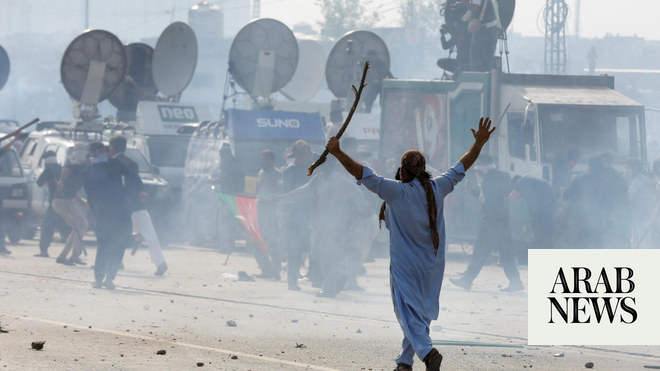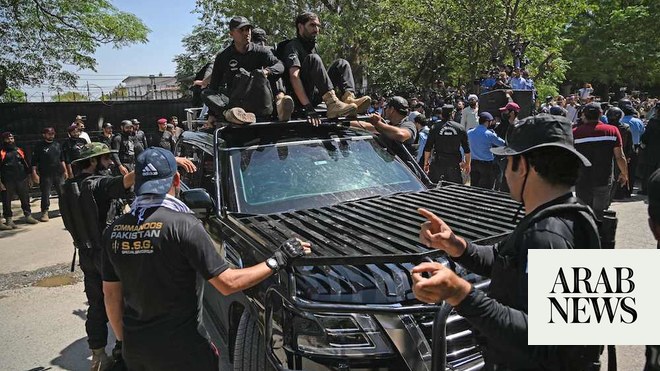
Analysts predict Khan is likely to fare better than his predecessors
No prime minister has completed a full term in office
ISLAMABAD: For 22 years, the charismatic cricket legend-turned-politician Imran Khan struggled for ascension to Pakistan’s most coveted chair of power, the throne of the prime minister of nuclear-armed Pakistan. Now he is slated to assume that position after being sworn in on Aug. 18.
Khan overcame the most daunting obstacles in his perilous journey, said Pakistan Tehreek-e-Insaaf insiders (PTI) who have witnessed many shades of his emotions battling personal to political affairs.
PTI emerging victorious in the 2018 general elections, ostensibly ushering in an era of “change” that broke the chains of a country locked in a status quo, has spread an aura of hope among the masses who used their mandate to vote in the rookie party.
Will the PTI chief fare better than his predecessors, most of whom succumbed to Pakistan’s violent and unmerciful politics in their alleged self-vested endeavour to achieve and hold reign?
The question may be premature but Khan will be put through the test of time, face difficult choices, make impossible decisions and be mindful of not falling victim to the unscrupulous political playground, institutional tugs-of-war, and infectious corruption that has tainted seven decades of Pakistan’s complex history.
“Imran Khan has built a political party on the basis of a difficult and tricky proposition: that the core of Pakistan’s problem is the corruption of public figures and government officials,” Mosharraf Zaidi, an ex-government adviser and seasoned analyst, told Arab News.
“If he were to pursue the issue whilst he is in power, he will have conflicts with every institution in the country, from within his party, to judges, bureaucrats and members of the military.”
The fight for captaincy to steer Pakistan democratically has been derailed four times by military interventions directly and indirectly.
In its disturbing history, one premier was murdered, another hanged by the judiciary, others dismissed by presidents, and two removed by judicial order, including the imprisoned ex-premier Nawaz Sharif and his family. Not one premier has ever completed a full term in office.
The bloodstained and unsparing politics of Pakistan have resulted in the deaths of many notable politicians in police encounters, by assassins, terrorists, security operations or in mysterious circumstances. The lucky few opted for self-imposed exile or were forced to flee the country.
This will not be the fate of Khan, say analysts.
“He is different from the rest of the politicians. He has no foreign assets, no corruption charges and no family to start hereditary politics,” said political expert Dr. Nazir Hussain.
“He has fought the election with a vision and has galvanized the youth and middle class while traditional politicians have been rejected by the masses.”
Khan’s major challenge is a dire economy on a brink of collapse. “If he can manage the economy, that would greatest achievement — even if he meets 25 percent of his targets, he will be successful,” said Hussain.
The public"s optimism about Khan and his party"s ability to govern the country is widespread. On the social media spectrum there is clear division between Khan’s destroyers and defenders, the latter being in larger numbers. His detractors, especially those who lost their electoral seats, have labelled him a military puppet but experts dismiss those accusations.
Analyst Qamar Cheema said Khan’s victory has upset the political balance maintained by political dynasties, religious parties, and veteran politicians. The PTI’s success has been a bitter pill to swallow for those who can’t accept the fact they lost their bastion constituencies.
“Frustration was visible among all political parties but those who are out of the race are more frustrated and isolated. Khan has been given the chance to change political culture and bring change in the social fabric with policies which others could not offer,” Cheema told Arab News.
Zaidi’s advice to Khan is “to approach the governance challenge from a technical rather than a political perspective. He will discover that the country’s primary problem is the absence of the will, capacity and resources to do better. If he brings the will, the capacity and resources will follow. Corruption will be reduced as a direct consequence of the change in the state’s priorities.
“In short, Khan can be very successful if he invests himself in solving the problems of ordinary Pakistanis — rather than chasing mirages,” said Zaidi.












